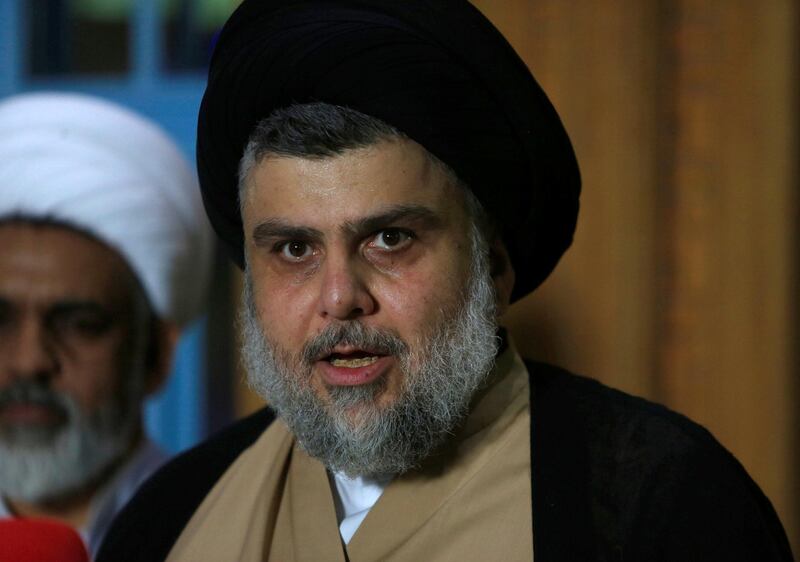The newly formed alliance between Iraq's populist Shiite cleric and an Iran-backed coalition is seen as a setback for hopes that last month's elections may have steered the country away from sectarianism.
Both Moqtada Al Sadr's Sairoun and Hadi Al Amiri's Fatah blocs won first and second place in May's elections, which has been marred by allegations of fraud and voter rigging.
"The formation of a new Shia superbloc is predictable, but nonetheless represents a missed opportunity to do something new – a diverse majority government in which some Shia blocs are excluded – and a return to something familiar, the Shia megabloc," Michael Knights, Iraq expert at the Washington Institute told The National.
Mr Al Amiri, a fluent Farsi speaker, is Iran’s closest ally in Iraq, having spent two years in exile there during the era of former dictator Saddam Hussein.
Yet, Mr Al Sadr's win could have dramatically changed Baghdad's political landscape with external powers. He is known for being a nationalist leader, waging anti-American and Iranian campaigns, as well as for his populist appeal to Iraq's young and poor.
"It's not a surprise, we knew that [Fatah] would continue to control the ministry of interior, which is one of the biggest sovereign ministries in Iraq's government, and they will continue to be a big part of it," Renad Mansour, research fellow at Chatham House in London, told The National.
At a news conference late on Tuesday, both leaders underscored that their alliance is aimed at expediting the formation of a new government, and they called on others to join them.
Although the new alliance controls 101 seats, it is still far from the 165 required for a majority.
"Al Sadr wants to maintain the victory of his list, so by negotiating with other Iranian-backed groups, it doesn’t mean that Al Sadr is a puppet of Iran, it’s about the negotiations on how to deal with Iran," Mr Mansour said.
The populist, who derives much of his legitimacy from his revered father Grand Ayatollah Muhammad Sadiq Sadr, assassinated in 1999 by Saddam's agents, is an unpredictable actor.
He also has street power – he managed to mobilise tens of thousands of supporters to protest against opponents and government policies in the years before the election.
_______________
Read more:
Turkish soldiers drive deeper into Kurdish Iraq
Abadi says Iraq will prevent PKK attacks on Turkey
Iraq deploys troops to Sinjar following Turkey's push against PKK
________________
Yet while the majority of Iraqis have yearned for a non-sectarian Iraq, last month's election has not changed the country's political scene, observers say.
"Each of Iraq's elections have produced fundamentally sectarian results. Kurds vote for Kurds, Sunnis for Sunnis, and Shia for Shia," Ali Khedery, chief executive of Dragoman Ventures, an international strategic advisory firm, told The National.
"A non-sectarian or cross-sectarian element of the population has always existed," he said.
Iran's grip on Iraq
Iran has previously manipulated the formation of Iraq's governments, and its militia allies are the most powerful forces in the country.
Tehran is under pressure to maintain its deep influence in Iraq – its most important Arab ally – at a time when its wider regional interests are under threat.
"Iran has cleverly taken full advantage of America's countless missteps since 2003, and it has intentionally sought to weaken, divide and transform Iraq into an Iranian vassal," Mr Khedery said.
The latest alliance may serve the purposes of the most powerful sides in Iraq politics as the country tries to rebuild from the devastating, years-long war against ISIS.
"For those who thought that Iraq's elections might have been a setback for Iran, time to think again," Andrew Parasiliti of the Rand Corporation told The National. "Despite positive signs of cross-sectarian coalitions and constituencies, the politicking around a new government is turning out to be more of the same. When the next Iraqi government is announced, it will have been blessed by Iran," Mr Parasilti said.
Iraq's prospects look "very grim", and as a result, the Middle East seems "destined for further convulsions", Mr Khedery said.






